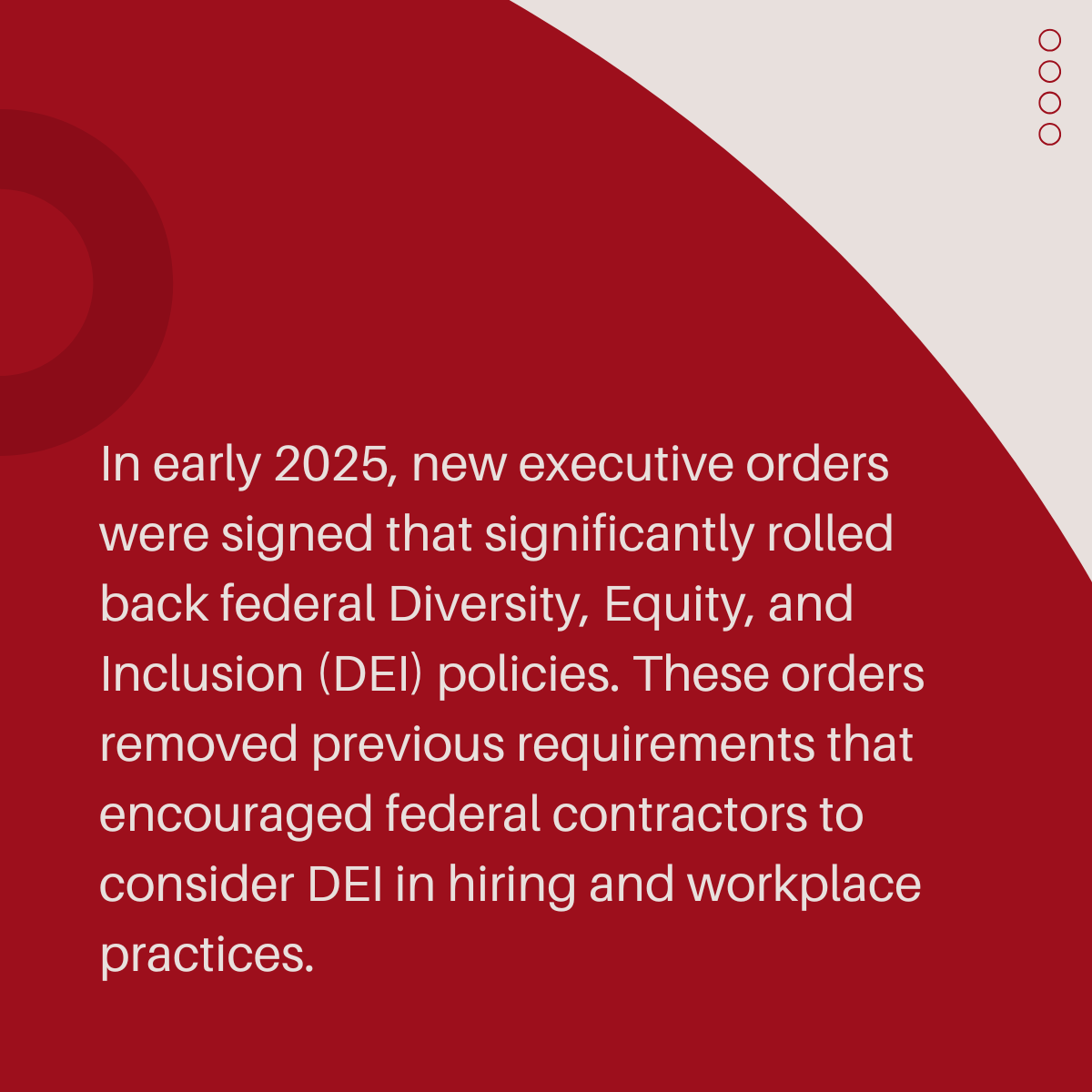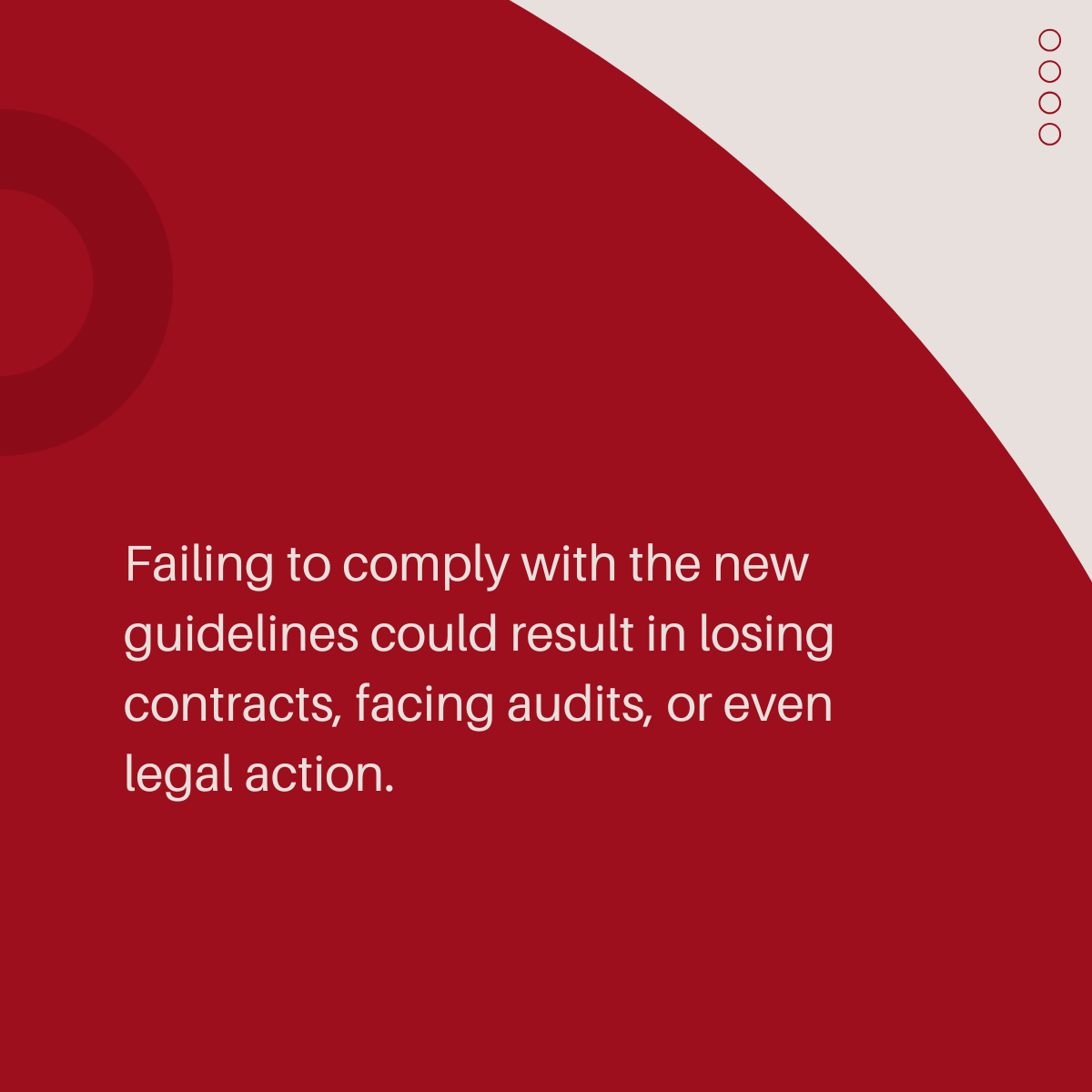
How the New DEI Executive Orders Could Impact Your Business
In early 2025, new executive orders were signed that significantly rolled back federal Diversity, Equity, and Inclusion (DEI) policies. These orders removed previous requirements that encouraged federal contractors to consider DEI in hiring and workplace practices. Now, the focus is shifting back to “merit-based” systems, and companies are being asked to prove they’re not using race, sex, or similar factors in employment decisions.
If your business works with federal agencies or receives public funding, these changes matter. You may be asked to update your policies or certify that your current ones don’t violate these new rules. And even if you’re not a contractor, these orders signal a broader shift that could influence how DEI is handled across industries.
With the rules changing fast, it’s a smart time to check in with a business attorney near you. The right legal guidance can help you avoid missteps and figure out how (or if) your business needs to adjust.
What Are the New DEI Executive Orders?
Two executive orders were signed to end federal DEI programs and reverse policies tied to affirmative action. These orders target both government agencies and private companies that do business with the federal government.
The first order eliminates DEI offices and programs within federal agencies, essentially shutting down efforts that were previously in place to address workplace inequality. The second order takes things further by revoking older policies that required federal contractors to consider factors like race or gender when hiring. Instead, it mandates a strict focus on individual qualifications and “merit-based” criteria.
For businesses, this means a sharp pivot away from formal DEI practices, especially if you rely on government contracts. If your company has DEI goals built into hiring, training, or supplier diversity programs, those might now come under legal scrutiny. While private companies are still free to pursue inclusion goals, doing so while holding a federal contract could pose legal risks if not done carefully.
These changes reshape the legal expectations for how businesses approach hiring, training, and company culture.

Who Do These Orders Apply To?
These new DEI executive orders mostly apply to businesses that work directly with the federal government, especially those holding federal contracts, grants, or agreements. If your company falls into that category, you’ll likely be asked to certify that you’re not using hiring or promotion practices based on race, sex, or other protected characteristics.
But even if you’re not a federal contractor, these orders could still affect you indirectly. When federal policies shift, they often influence broader industry standards. Vendors, subcontractors, and companies aiming to win future contracts may start adjusting their internal policies to align with the new expectations.
It’s also possible that state governments or private partners will follow the federal lead, especially in states already looking to scale back DEI efforts. That means the ripple effect could reach smaller businesses and startups too, particularly in sectors like tech, construction, healthcare, and education.
If you’re unsure whether your business is affected, it’s worth speaking with a business law attorney near you. They can help clarify where you stand and what, if anything, you need to change.
Potential Impacts on Business Operations
For many businesses, these new executive orders mean it’s time to review current practices. Some of the areas that could be affected include:
- Hiring and Promotions: Practices that prioritize diversity goals may now be considered non-compliant. You’ll need to ensure hiring is clearly based on individual qualifications.
- Training Programs: Workshops or employee training that focus specifically on race or gender-based topics might come under legal scrutiny.
- Vendor and Supplier Programs: If you have supplier diversity goals or partnerships based on minority or women-owned status, those may need to be re-evaluated in light of the new rules.
- Internal Audits and Reporting: Companies may be asked to prove that they’re not favoring any group based on identity, which could involve updating how you track and report hiring or promotion data.
Failing to comply with the new guidelines could result in losing contracts, facing audits, or even legal action. On the other hand, reviewing your policies now can help you stay ahead and avoid problems.
This is where business law attorneys come in. A lawyer who understands employment law and government contracts can help you update your policies, avoid risky language, and protect your business.

Legal Risks and Opportunities
The shift away from mandated DEI practices brings both risk and opportunity, depending on your business model and how prepared you are to adapt.
Legal Risks
If your company continues using policies that favor certain groups based on race, gender, or other protected categories, particularly in hiring or advancement, you could face legal challenges. For federal contractors, non-compliance could mean canceled contracts, blocked renewals, or audits. Even if you’re not under contract, you may still be vulnerable to discrimination claims if your internal practices don’t align with updated federal standards.
Opportunities
At the same time, this is a chance for businesses to refocus on clear, skills-based hiring and transparent performance standards. Companies that move quickly to review and adjust policies will be better positioned to avoid scrutiny and stand out as compliant partners in competitive bidding processes. By aligning your policies with the new executive orders while still promoting fairness and inclusion in practical ways, you can stay competitive and legally protected.

How a Business Attorney Can Help
With executive orders changing the rules around DEI, having a business attorney in your corner is important. A qualified business law attorney can:
- Review Your Existing Policies: They’ll identify language or practices that might now be considered risky or non-compliant under the new rules.
- Update Employee Handbooks and Contracts: From hiring guidelines to training protocols, your documentation may need adjustments to reflect the shift in legal expectations.
- Advise on Future Hiring and Promotion Practices: If your company has used diversity goals or affirmative action strategies in the past, a lawyer can help you build a system that still promotes fairness without violating current regulations.
- Protect You From Legal Exposure: Whether it’s helping you navigate a federal audit or shielding your company from potential discrimination claims, your attorney’s job is to keep you compliant and out of trouble.
Whether you support the rollback of DEI requirements or not, the reality is that the rules have changed and businesses need to keep up.
Now is the time to review your internal policies, assess any DEI initiatives, and make sure your business is protected. A business attorney can help you sort through the details and reduce your liability.
Need guidance? Reach out to DMAB, a trusted business law firm.
